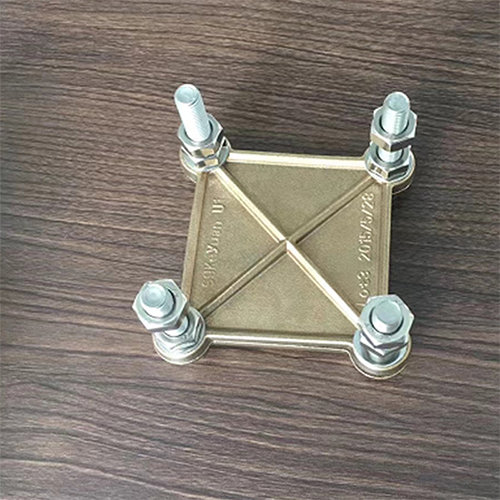The wire clamp is used to connect the bus down conductor to the outlet terminal of electrical equipment (such as transformers, circuit breakers, mutual inductors, isolating switches, wall bushings, etc.). Nowadays, the outlet terminals of commonly used electrical equipment are copper and aluminum, and the lead-out wires are mostly aluminum stranded wires or steel-cored aluminum stranded wires. Therefore, the equipment clamps are divided into two types: copper equipment clamps and copper-aluminum transition equipment clamps. series.
Product Details
A copper clamp is a type of clamp or fastening device that is made primarily from copper or has copper components. Copper is a highly conductive metal that possesses excellent electrical and thermal conductivity properties. Copper clamps are utilized in various applications where a secure and reliable electrical connection is required.
Here are a few common applications and uses of copper clamps:
- Electrical Connections: Copper clamps are commonly used in electrical systems to create secure connections between conductive components. They are often utilized for joining copper wires or cables together or connecting them to terminals, bus bars, or other electrical devices. Copper clamps ensure a low-resistance connection, allowing for efficient current flow and minimizing the risk of overheating or electrical failure.
-
Grounding and Bonding: Copper clamps play a crucial role in grounding and bonding systems. They are used to establish a reliable electrical connection between conductive parts and the grounding or bonding system. Copper grounding clamps are often attached to grounding electrodes, such as grounding rods or plates, to provide a secure and low-resistance path for electrical currents to dissipate safely into the ground. Bonding clamps, on the other hand, are used to connect metal objects or structures together to equalize their electrical potential and reduce the risk of electrical shocks or damage.
-
Pipe and Tube Clamping: Copper clamps are also employed in plumbing and HVAC (heating, ventilation, and air conditioning) systems for securing copper pipes or tubes in place. These clamps help prevent the pipes from vibrating, shifting, or experiencing excessive movement, ensuring a stable and secure installation. They are often used in residential, commercial, and industrial plumbing applications.
-
Automotive Applications: Copper clamps find use in the automotive industry for various electrical connections. They are used for securely fastening battery cables, grounding straps, and other electrical components. Copper clamps provide a reliable connection that can withstand vibrations, temperature fluctuations, and other harsh conditions typically encountered in automotive environments.
It's worth noting that copper clamps come in different shapes, sizes, and designs to accommodate specific applications. They may have screw-type, compression, or bolted designs, depending on the specific requirements of the connection. Additionally, copper clamps are often plated or coated to enhance corrosion resistance and improve overall durability.
Overall, copper clamps are widely utilized in electrical, grounding, plumbing, and automotive applications to ensure secure and efficient connections. Their use of copper as a conductor provides excellent conductivity properties, making them a popular choice in various industries.
 English
English  Español
Español  Português
Português  русский
русский  français
français  日本語
日本語  Deutsch
Deutsch  Tiếng Việt
Tiếng Việt  Italiano
Italiano  Nederlands
Nederlands  ไทย
ไทย  Polski
Polski  한국어
한국어  Svenska
Svenska  magyar
magyar  Malay
Malay  বাংলা
বাংলা  Dansk
Dansk  Suomi
Suomi  हिन्दी
हिन्दी  Pilipino
Pilipino  Türk
Türk  Gaeilge
Gaeilge  عربى
عربى  norsk
norsk  اردو
اردو  čeština
čeština  Ελληνικά
Ελληνικά  Українська
Українська  Javanese
Javanese  فارسی
فارسی  தமிழ்
தமிழ்  తెలుగు
తెలుగు  नेपाली
नेपाली  Burmese
Burmese  ລາວ
ລາວ  Қазақ
Қазақ  Euskal
Euskal  slovenský
slovenský  Македонски
Македонски  Română
Română  Српски
Српски  简体中文
简体中文  Afrikaans
Afrikaans  עִברִית
עִברִית  יידיש
יידיש  Беларус
Беларус  മലയാളം
മലയാളം  Hawaiian
Hawaiian  հայերեն
հայերեն 














